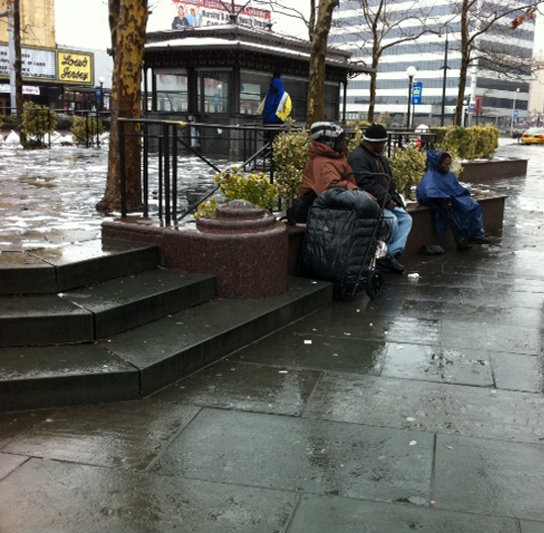Charles E. Donaldson became homeless seven years ago. “They put their hands on me, beat me up, and threw me out,” he said recently, giving his version of the day he was evicted from an apartment at the Booker T. Washington Public Housing Complex on Colden Street.
A widower and father of eight children – one of whom, he said, attends Hudson County Community College, just two blocks from the streets where he sleeps most nights – Donaldson said, “I used to have it all: A wife, a job, a home.”
Exactly what led to his eviction – the death of his wife, the loss of a job, alcohol use (which he admits to) – isn’t clear. What is clear is that the 51-year-old, who speaks with some sort of impediment, is worse for the wear after living on the street for the better part of the last decade, even though he often says emphatically, “I’m a survivor.”
Social service programs in Hudson County get $5 million to spend on this population annually.
____________
While this census of the homeless is generally done annually, the 2011 census was called off due to a bad snowstorm that moved through the area on the day the count was scheduled. Thus, the count taken on Jan. 25 is the first one to be conducted in Hudson County since 2010. That year, advocates for the homeless counted 1,779 people without homes in Hudson County. Advocates estimate there were 1,536 Hudson County residents who were homeless last year.
Addressing the chronically homeless
The U.S. Department of Housing and Urban Development requires counties to conduct a census of homeless people every two years, although many counties, including Hudson County, try to do it annually. The information gathered is used to give the federal government and communities a sense of which social services are needed for homeless populations and helps determine how federal grant money should be allocated.
“This year the count was improved in that we had more detailed maps [of where to find people] from street outreach teams that work in Hudson County on a daily basis. In the past our census teams weren’t given maps. They were just given general areas to go to,” said Randi Moore, housing assistance program director for the Hudson County Division of Housing and Community Development.
The National Alliance to End Homelessness recently released national census findings from 2009 to 2011. The report said that nationally, there was a 1 percent decrease in homelessness between those years. Still, more than half a million people – 636,017 – were homeless last year, according to the organization.
For the first time in many years, Hudson County’s HUD grant has earmarked $1.5 million to be used on programs that will specifically help the chronically homeless – those who are homeless due to myriad issues that can range from substance abuse to mental health issues, physical disability, cognitive disability, or a history of incarceration. The money will be used to rent 50 units of permanent housing. The balance of the county’s $3.5 million grant , will be used for such renewal projects that help homeless families, the working homeless, Jersey City’s York Street Project, and other programs.
As in other counties throughout New Jersey, the Hudson County census was conducted in two parts.
Early on Wednesday, census counters surveyed people who attended Project Homeless Connect, an event organized by the Hudson County Alliance to End Homelessness held on Bergen Avenue in Jersey City. Through the event, people could get a hot meal, clothing, and access to more than 30 service provider groups who participated.
That night, volunteers fanned out into the streets to count people taking shelter in PATH stations, emergency rooms, fast food restaurants, and on the streets. About 70 service workers, volunteers, and advocates for the homeless scope out abandoned buildings, shelters, parks, ERs, transportation hubs, and other spaces.
‘People are real good to us’
At Journal Square, where three homeless people died last summer, Donaldson and his homeless neighbors were appreciative of the many community volunteers who help feed and clothe them year round.
“People are real good to us,” said a woman who only gave her name as Kathy. “Every week people come out, give us food, hot coffee.”
Agreeing with her, a man named Patrick nodded, adding, “Those protesters care about us more than the higher-ups.” He was referring to members of Jersey City Peace Movement, who distribute food, blankets, and sleeping bags each week, and, more recently, the Occupy Journal Square demonstrators who have also extended a friendly hand.
Patrick – a 23-year-old ex-offender who said he will leave New Jersey for a warmer state where he has family once his probation ends – said homelessness was harder for some than others.
“Young people like me, we can take it out here,” he said. “But there’s no way a guy like [disabled homeless man Alfonso Daniels] or an old guy like Donaldson should be out here. No way.”
Hudson County has a hotline for those seeking shelter and housing assistance. The number is (800) 624-0287. It takes time for the phone to be answered, but eventually someone does pick up.
E-mail E. Assata Wright at awright@hudsonreporter.com.
